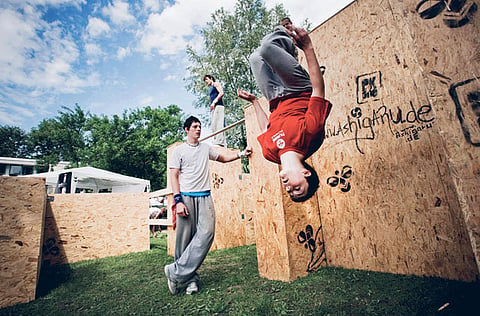Parkour - the next big cultural phenomenon
From films like Casino Royale and Prince of Persia to online communities and public spaces, Parkour is here and could potentially be the next cultural phenomenon

On a recent June afternoon, a handful of young men clad in baggy sweat pants, slim-fitting T-shirts and ultra-lightweight sneakers take turns flinging themselves off a shopping centre's third-storey mezzanine in Los Angeles, leaping from level to level, before back-flipping, belly-sliding and bouncing to a stop on the ground floor of the atrium.
It's the taping of the season finale of MTV's Ultimate Parkour Challenge, a six-episode series showcasing the practitioners of parkour, a street sport that's part gymnastics, part stunt work, and all about moving from point A to point B by any means necessary.
If you're unfamiliar with the name (which has its roots in the French word parcours, meaning "route"), you may have seen the human pinball effect in the opening chase scene of the 2006 James Bond film Casino Royale.
More recently, Disney's Prince of Persia: The Sands of Time featured acrobatic fight scenes that had the cast careening off walls and leaping off roofs in parkour-style moves. (David Belle, the Frenchman considered the founder of the sport, worked on that film as parkour stunt coordinator.)
‘Free running'
At its most basic, parkour, which Belle developed in France in the late 1990s, consists of running along a route and negotiating any and every obstacle as efficiently as possible. Some purists argue that the phrase "free-running" should be used when referring to the iteration of the discipline that incorporates theatrical flourishes such as flips and spins.
From France, the sport spread to the UK and then to the US in the early years of the new millennium. Despite being a below-the-radar discipline, some involved in the sport think it's headed from a niche physical fitness subculture into mass consciousness — and that it will happen this year or next.
"I think parkour is going to be twice as big as skateboarding — it's going to be huge," says Mark Toorock, a Washington, DC, fitness trainer and parkour practitioner who founded an online community called American Parkour (APK) in 2005.
"Skateboarding is the $4 - to $5-billion (Dh14.68 - Dh18.35 billion) industry it is because it's not just [for] people who skate," Toorock notes, "but people like my uncle who've never gotten on a skateboard but still own a pair of Vans [skate shoes]."
Toorock uses the skate industry to explain when he forecasts freerunning is about to become a major force in the action sports arena.
"Skateboarding first came out of surfing in the late '60s," he said, "but took until the late '80s and '90s to become what we know it as today. It took snowboarding about half that time to become an Olympic sport, and the next thing you have that's similar to that is parkour — which has been out of France for about eight years — so it's close to that point."
No special equipment
Victor Bevine, an executive producer of Ultimate Parkour Challenge and a co-founder of the recently created World Freerunning & Parkour Federation, shares that view of the future. "I actually think it can be twice as big," Bevine said. "Everybody under the age of 18 knows what this is."
Parkour as a launchpad for soon-to-be popular lifestyle brands is far from a universal opinion, especially since no specialised equipment or clothing is actually needed. While many consider sturdy, lightweight running shoes a basic necessity (K-Swiss launched the first parkour-specific shoe in 2007), some think barefoot is best. Pants are usually loose-fitting enough to allow unhindered movement and offer some protection from abrasion, although here personal choices include running shorts, baggy sweats modified to mid-calf and cargo pants (so maps and other gear can be stowed in the pockets). Tops are soft, lightweight T-shirts.
"As a subculture I don't think it will go too far past rock climbing," says Cliff Kravit, the founder of a California parkour community called PKCali. "I doubt it will even reach the popularity level of yoga."
Kravit, who teaches a weekly class locally, said he notices a surge in popularity every time there's media focus on parkour. "After Prince of Persia, the class was overflowing," he said.



